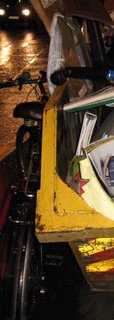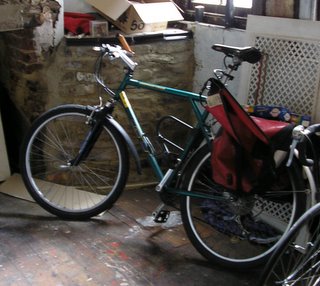 Last Friday, as I was finishing my weekly shift at the food Co-Op, I went outside to bring the shop sign inside. Then I noticed my bike had disappeared. I forced myself to look again, but it definitely wasn't where I locked it. It took a few seconds before it really hit me. I felt gutted.
Last Friday, as I was finishing my weekly shift at the food Co-Op, I went outside to bring the shop sign inside. Then I noticed my bike had disappeared. I forced myself to look again, but it definitely wasn't where I locked it. It took a few seconds before it really hit me. I felt gutted.I soon realized that my keys were also missing. So I must have dropped my set of keys near the bike, and the kids simply used them to open the lock and cycle away (nothing remained behind, not even the usual witness of a murdered lock). I felt exceptionally stupid: had no one to blame but myself.
A bike is just an object, an earthly possession, a vehicle. It can be replaced, its loss is not a tragedy. Yet for me, my bike was also one of the few threads connecting my life in Jerusalem to my life in London: between my previous self, a straight kind-of-kid with conenventional politics, and my London incarnation as an anrachish-scholarly-squatter, urban scavenging mink. I was very attached to it. I decided to write about it here.
* * *
I bought it in a small bike shop in an ugly, marble floored Jerusalem mall, on a Saturday night. The shop owner was called Dov, a very Israeli name, but he had a strong American accent, a silver coloured short beard, and a 1960s music poster on the wall (joan baez, I think). I guessed he was an ex-hippie. It was obvious that he loved bikes. It was equally obvious he wasn't happy being there on Saturday night.
The bike, a hybrid, green GT (Outpost Trail) was on offer, and it had suspension on the front wheel. As I was getting some accessories for it, Dov received a phone call from his wife, saying his daughter has just given birth. He was very happy.
'My first grandson' he told me. He gave me a light reflector for free.
* * *
 I was working at a software company in an industrial park in Jerusalem at the time. It was just at the end of the dot.com bubble; people were still talking about getting rich. Most people at work had a brand new car, from leasing agencies. They lived in an air-conditioned world, from the car, through the lift, to the company open-desk offices; talked about ski-holidays and pretended to be living in Palo Alto California.
I was working at a software company in an industrial park in Jerusalem at the time. It was just at the end of the dot.com bubble; people were still talking about getting rich. Most people at work had a brand new car, from leasing agencies. They lived in an air-conditioned world, from the car, through the lift, to the company open-desk offices; talked about ski-holidays and pretended to be living in Palo Alto California.After my 1976 VW beetle was stolen, I started cycling to work. I would go through the Sepharadic neighbourhood of the Shuk, the Fruit and Veg market,, and then through the poor ultra-orthodox neighbourhoods. Getting to work was 15 minutes downhill; coming back, after 11 hours of work, was 40 minutes uphill. But I didn't care, because I was going home. I used to cycle through one alleyway where born-again Jews were praying the evening prayer outside a synagogue. 'Come on, stop and join us' they would say. 'Hmm, don't think so, thanks'.
All through my programming days, I was trying to keep sane, to hold my grip on reality in the sickly virtual world of money and code, of florescent lights and American corporate speech. Cycling helped me: it was sweaty and sweet, hard and satisfying.
* * *
When S and I moved to London, getting bike was one of the first things I did. For a while I was using Nasim's watermelon-coloured bike (red, green and black stripes). And then a crappy Raleigh bike. When I realized I was going to stay in London for a few years, I decided to bring my Jerusalem bike over. On my next visit home, I asked it back from my brother. It was sitting in his balcony in Tel Aviv.
Shame, he said, I just fixed a flat tyre.
Tel Aviv, London Gatwick, Blackfriars, Tower Bridge, and on the DLR to Limehouse. It felt like a new beginning. We were getting evicted in five weeks.
* * *
In my life in London, a bike is not just a means of transport. It's a means of survival. It's how I brought home everything I would find on the streets: woolly blankets, shelves, electric heaters, laser printers, rags, clothes... you can carry so much on a bike. And of course, food. Fruit and veg from the market; packed sushi and sandwiches I'd skip on the way home; sacks of organic bread, thrown away by posh restaurants; and stuff I bought from the Co-Op, like 25 kg sacks of oats, for me and my housemates (at one point there were 23 of them).
It took me wherever I wanted to go in London: to college, to the British Library, to cinemas and squat parties. It waited for me patiently until I was ready to go back home. It was my steadfast green horse, day and night, rain or sunshine. No need to wait for the bus, no money spent on the tube. My faithful bike helped me come to terms with London; it helped me feel safe to roam and expore the city; it made me feel at home, even when I was getting evicted and had nowhere to go.
* * *
I'd like to say that I treated it well. But that would be a lie. Unfortunately I always had friends/housemates who were rickshaw riders or bike geeks and could fix it for me when I needed, so I was lazy about taking care of it myself. Still, I cleaned it and oiled it every once in a while. The last time was just two weeks ago.
Also, I didn't go on long travels with it. Didn't take it to exotic places. One day trip in Norfolk, that's all. I feel a bit bad; but then, it travelled all across South London and the East End.
I went to the stolen bike market in Brick Lane on Sunday, and to local bike shops around the Elephant, but couldn't see it anywhere. I hope it wasn't slaughtered for its parts. And somehow I hope I'd still see it someday. Not too many GT bikes in London.



No comments:
Post a Comment